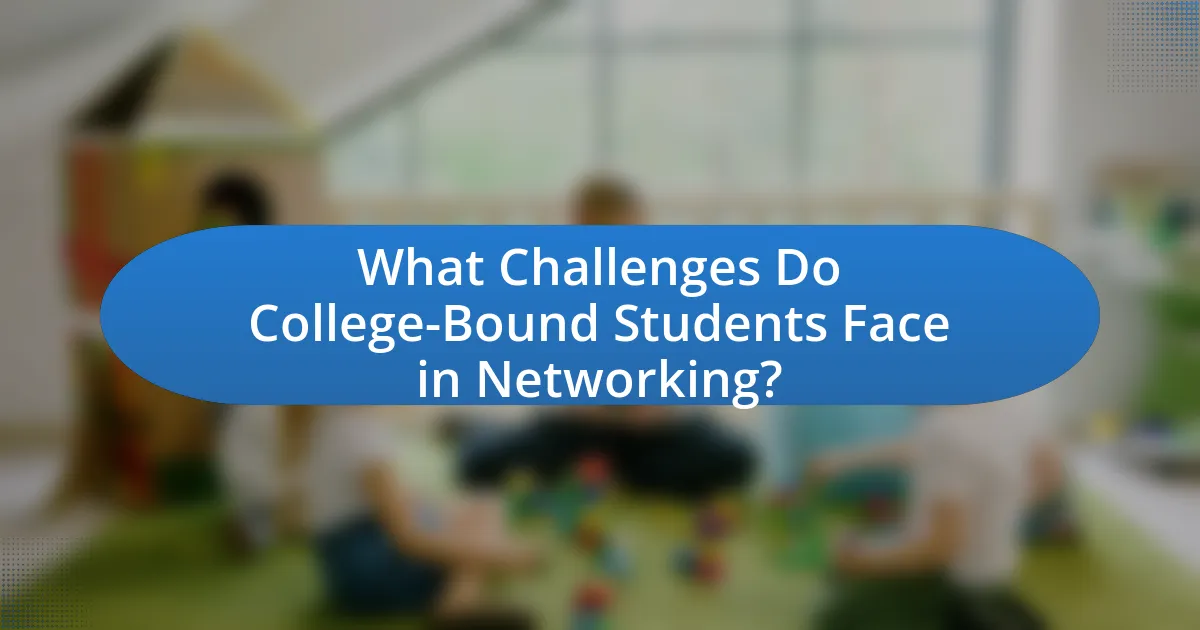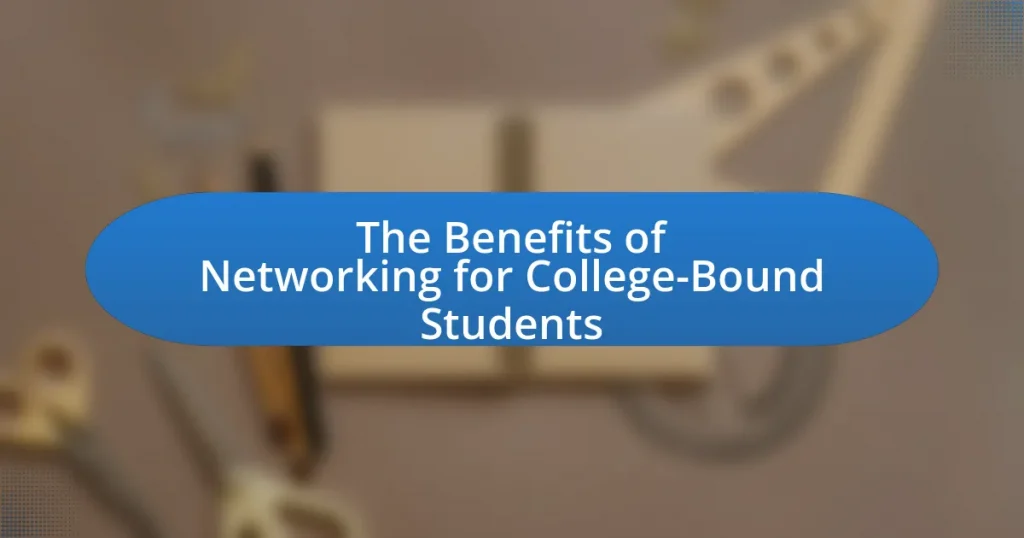The article focuses on the benefits of networking for college-bound students, emphasizing its role in personal and professional development. It highlights how networking provides access to job opportunities, enhances college admissions prospects, and facilitates the acquisition of valuable recommendations and scholarships. Additionally, the article discusses the social benefits of networking, including the development of communication skills and confidence, as well as strategies for effective networking, overcoming challenges, and maintaining connections over time. Overall, it underscores the importance of building a robust professional network for academic and career success.

What are the Benefits of Networking for College-Bound Students?
Networking provides college-bound students with essential opportunities for personal and professional growth. By connecting with peers, mentors, and industry professionals, students gain access to valuable resources, advice, and potential job opportunities. Research indicates that 70% of jobs are found through networking, highlighting its importance in career advancement. Additionally, networking helps students develop communication skills and build confidence, which are crucial for success in college and beyond. Engaging in networking activities can also lead to collaborations on projects, internships, and recommendations that enhance a student’s academic and career prospects.
How does networking impact college admissions?
Networking significantly impacts college admissions by providing students with access to valuable information, mentorship, and opportunities that can enhance their applications. Through networking, students can connect with alumni, admissions officers, and current students, gaining insights into the admissions process and specific programs. For instance, a study by the National Association for College Admission Counseling found that personal connections can influence admissions decisions, as recommendations from trusted sources often carry weight. Additionally, students who engage in networking may discover internships or extracurricular activities that strengthen their profiles, making them more competitive candidates.
What role do connections play in securing college recommendations?
Connections significantly enhance the likelihood of securing college recommendations. When students have established relationships with teachers, mentors, or professionals, these individuals are more inclined to provide personalized and compelling endorsements. Research indicates that recommendations from known contacts often carry more weight, as they reflect a deeper understanding of the student’s abilities and character. For instance, a study by the National Association for College Admission Counseling found that 75% of colleges consider recommendations important in their admissions process, emphasizing the value of strong connections in this context.
How can networking influence scholarship opportunities?
Networking can significantly influence scholarship opportunities by connecting students with mentors, alumni, and organizations that provide funding. These connections often lead to insider knowledge about available scholarships, application tips, and recommendations that enhance a student’s profile. For instance, a study by the National Association of Colleges and Employers found that 70% of jobs are found through networking, indicating that similar principles apply to scholarships, where personal connections can lead to opportunities that are not widely advertised. Additionally, networking can result in personalized endorsements from influential figures, which can greatly strengthen a scholarship application.
Why is networking important for career development?
Networking is important for career development because it facilitates access to job opportunities, industry insights, and professional relationships. By connecting with others in their field, individuals can gain referrals, mentorship, and insider knowledge that can significantly enhance their career prospects. Research indicates that approximately 70% of jobs are found through networking, highlighting its critical role in the job search process. Additionally, networking helps build a personal brand and reputation, which are essential for long-term career success.
What skills can students gain through networking?
Students can gain essential skills such as communication, relationship-building, and professional etiquette through networking. Effective communication skills are developed as students engage in conversations with peers, mentors, and industry professionals, enhancing their ability to articulate ideas clearly. Relationship-building skills are fostered as students learn to connect with diverse individuals, which can lead to future collaborations and opportunities. Additionally, networking teaches professional etiquette, including how to present oneself in formal settings, which is crucial for career advancement. These skills are vital for success in both academic and professional environments, as evidenced by studies showing that strong networking abilities correlate with higher job placement rates and career satisfaction.
How does networking help in exploring career options?
Networking helps in exploring career options by providing access to information, opportunities, and insights from professionals in various fields. Through networking, individuals can engage with industry experts, attend events, and participate in discussions that reveal potential career paths and job openings. Research indicates that 70% of jobs are found through networking, highlighting its effectiveness in uncovering opportunities that may not be advertised publicly. Additionally, networking allows individuals to gain firsthand knowledge about different roles, company cultures, and industry trends, which can significantly inform their career decisions.
What social benefits does networking provide for college-bound students?
Networking provides college-bound students with essential social benefits, including access to mentorship, peer support, and professional connections. These relationships can enhance students’ academic experiences and career opportunities. For instance, studies show that students who engage in networking are more likely to receive guidance from mentors, which can lead to improved academic performance and increased chances of securing internships or job placements. Additionally, networking fosters a sense of community, helping students build friendships and collaborative relationships that can support their educational journey.
How can networking enhance social skills and confidence?
Networking enhances social skills and confidence by providing opportunities for individuals to engage in conversations, build relationships, and practice interpersonal communication. Through networking events, college-bound students can interact with diverse groups, which helps them develop active listening, empathy, and effective speaking skills. Research indicates that individuals who frequently network report higher levels of self-efficacy and social comfort, as they become accustomed to initiating and maintaining conversations in various settings. For example, a study published in the Journal of Applied Psychology found that networking activities significantly improve social competence and self-esteem among participants, reinforcing the idea that regular interaction in professional contexts fosters greater confidence and social adeptness.
What role does networking play in building lasting friendships?
Networking plays a crucial role in building lasting friendships by facilitating connections among individuals with shared interests and experiences. Through networking, college-bound students can meet peers, mentors, and professionals, creating a foundation for meaningful relationships. Research indicates that social connections formed during college years significantly influence personal and professional success, with studies showing that 70% of jobs are found through networking. This highlights the importance of building a network not only for career opportunities but also for fostering friendships that can endure beyond academic settings.

How can College-Bound Students Effectively Network?
College-bound students can effectively network by actively participating in school events, joining clubs, and utilizing social media platforms like LinkedIn. Engaging in these activities allows students to meet peers, educators, and professionals who can provide valuable insights and opportunities. For instance, according to a study by the National Association of Colleges and Employers, 85% of jobs are filled through networking, highlighting the importance of building connections early. By attending workshops, career fairs, and informational interviews, students can expand their network and enhance their chances of success in college and beyond.
What strategies can students use to build their network?
Students can build their network by actively participating in campus organizations and events. Engaging in clubs, attending workshops, and joining professional associations allows students to meet peers and industry professionals, fostering valuable connections. Research indicates that networking can lead to job opportunities; for instance, a study by the National Association of Colleges and Employers found that 85% of jobs are filled through networking. Additionally, utilizing social media platforms like LinkedIn enables students to connect with alumni and professionals in their field, further expanding their network.
How can students leverage social media for networking?
Students can leverage social media for networking by actively engaging with professionals and peers in their fields of interest. By creating a strong online presence on platforms like LinkedIn, students can showcase their skills, share relevant content, and connect with industry leaders. Research indicates that 70% of jobs are found through networking, highlighting the importance of building relationships online. Additionally, participating in discussions, joining relevant groups, and attending virtual events can enhance visibility and foster connections that may lead to internships or job opportunities.
What are the best practices for attending networking events?
The best practices for attending networking events include preparing an elevator pitch, researching attendees, and following up after the event. Preparing an elevator pitch allows individuals to succinctly introduce themselves and their goals, which is crucial in making a strong first impression. Researching attendees helps in identifying key individuals to connect with, enhancing the effectiveness of networking efforts. Following up after the event solidifies connections and demonstrates professionalism, increasing the likelihood of future opportunities. According to a study by the Harvard Business Review, effective networking can lead to job opportunities and career advancement, highlighting the importance of these practices for college-bound students.
How can students maintain and grow their network over time?
Students can maintain and grow their network over time by actively engaging with their contacts through regular communication and participation in networking events. Consistent outreach, such as sending follow-up emails, scheduling catch-up meetings, or connecting on professional platforms like LinkedIn, helps reinforce relationships. Additionally, attending industry conferences, workshops, and alumni events allows students to meet new contacts while strengthening existing connections. Research indicates that 70% of jobs are found through networking, highlighting the importance of maintaining these relationships for career advancement.
What follow-up techniques are effective after initial meetings?
Effective follow-up techniques after initial meetings include sending personalized thank-you emails, scheduling follow-up calls, and connecting on professional networking platforms. Personalized thank-you emails reinforce the connection made during the meeting and can include specific references to topics discussed, which enhances engagement. Scheduling follow-up calls allows for deeper discussions and clarifications, fostering stronger relationships. Connecting on professional networking platforms, such as LinkedIn, helps maintain ongoing communication and provides opportunities for future interactions. Research indicates that consistent follow-up can increase the likelihood of successful networking outcomes, as it demonstrates commitment and interest in the relationship.
How can students utilize alumni networks for ongoing support?
Students can utilize alumni networks for ongoing support by actively engaging with alumni through networking events, mentorship programs, and online platforms. Engaging with alumni allows students to gain insights into career paths, receive guidance on job searches, and access industry connections. Research indicates that 70% of jobs are found through networking, highlighting the importance of leveraging alumni relationships for professional opportunities. Additionally, alumni often provide valuable resources such as internships, job leads, and advice based on their own experiences, which can significantly enhance a student’s career development.

What Challenges Do College-Bound Students Face in Networking?
College-bound students face several challenges in networking, including limited access to professional contacts, lack of experience in networking strategies, and social anxiety. Limited access to professional contacts arises from the students’ relatively young age and inexperience, which can hinder their ability to connect with industry professionals. Additionally, many college-bound students may not have been exposed to effective networking strategies, making it difficult for them to initiate and maintain professional relationships. Social anxiety can further complicate networking efforts, as students may feel intimidated in unfamiliar social settings or when approaching potential mentors. These challenges can significantly impact their ability to build valuable connections that are essential for career development.
What common obstacles do students encounter when networking?
Students commonly encounter obstacles such as lack of confidence, limited access to networking opportunities, and inadequate communication skills when networking. Lack of confidence can hinder students from initiating conversations or approaching professionals, which is crucial for effective networking. Limited access to networking opportunities often arises from geographical constraints or insufficient exposure to industry events, making it difficult for students to connect with potential mentors or employers. Additionally, inadequate communication skills can prevent students from effectively articulating their interests and goals, leading to missed opportunities for meaningful connections. These challenges can significantly impact a student’s ability to build a professional network, which is essential for career development.
How can students overcome shyness or social anxiety in networking situations?
Students can overcome shyness or social anxiety in networking situations by preparing in advance and practicing social skills. Preparation can include researching attendees, formulating conversation starters, and setting specific networking goals, which helps build confidence. Practicing social skills through role-playing or joining clubs can also reduce anxiety by creating familiarity with social interactions. Studies show that exposure to social situations gradually decreases anxiety levels, as evidenced by research from the Journal of Anxiety Disorders, which indicates that repeated exposure can lead to desensitization.
What misconceptions about networking should students be aware of?
Students should be aware that one major misconception about networking is that it is solely about self-promotion and personal gain. In reality, effective networking is built on mutual benefit and relationship-building, where both parties exchange value and support. Research indicates that 70% of jobs are found through networking, highlighting the importance of genuine connections rather than transactional interactions. Additionally, many students believe that networking is only for extroverts; however, introverts can also excel by leveraging their listening skills and forming deeper, meaningful relationships. Understanding these misconceptions can help students approach networking more effectively and authentically.
How can students address these challenges effectively?
Students can address networking challenges effectively by actively participating in campus organizations and events. Engaging in these activities allows students to meet peers, faculty, and industry professionals, thereby expanding their network. Research indicates that 70% of jobs are found through networking, highlighting its importance in career development. Additionally, students can utilize online platforms like LinkedIn to connect with alumni and professionals in their field, further enhancing their networking opportunities. By combining in-person interactions with digital networking, students can create a robust support system that aids in overcoming challenges related to career advancement.
What resources are available to help students improve their networking skills?
Students can improve their networking skills through various resources such as workshops, online courses, networking events, and mentorship programs. Workshops often provide hands-on experience and practical tips for effective communication and relationship-building. Online platforms like LinkedIn Learning and Coursera offer courses specifically focused on networking strategies and professional development. Networking events, including career fairs and industry meetups, allow students to practice their skills in real-world settings and connect with professionals. Additionally, mentorship programs pair students with experienced individuals in their field, providing guidance and opportunities to expand their professional network. These resources collectively enhance students’ ability to build meaningful connections in their academic and future professional lives.
How can mentorship play a role in overcoming networking challenges?
Mentorship can significantly aid in overcoming networking challenges by providing guidance, support, and access to established networks. Mentors often possess extensive professional connections and can introduce mentees to key individuals in their field, facilitating valuable relationships. Research indicates that 70% of mentored individuals report improved networking skills, which enhances their ability to connect with others effectively. Additionally, mentors can offer personalized advice on how to navigate social situations, helping mentees build confidence and develop their networking strategies. This structured support ultimately leads to increased opportunities and a stronger professional network for college-bound students.
What are the best practices for successful networking?
The best practices for successful networking include building genuine relationships, actively listening, and following up consistently. Building genuine relationships involves connecting with individuals on a personal level, which fosters trust and opens doors for future opportunities. Actively listening during conversations demonstrates respect and allows for meaningful exchanges of ideas, enhancing the networking experience. Following up consistently, such as sending a thank-you note or scheduling a follow-up meeting, reinforces connections and keeps the communication lines open. Research indicates that 70% of jobs are found through networking, highlighting the importance of these practices in achieving professional success.
How can students prepare for networking opportunities?
Students can prepare for networking opportunities by developing a clear personal brand and practicing effective communication skills. Establishing a personal brand involves identifying strengths, interests, and career goals, which helps students present themselves confidently to potential contacts. Practicing communication skills, such as active listening and concise self-introduction, enhances interactions during networking events. Research indicates that 70% of jobs are found through networking, highlighting the importance of preparation in making meaningful connections.
What etiquette should students follow during networking interactions?
Students should follow several key etiquette guidelines during networking interactions to create positive impressions and foster meaningful connections. First, students must arrive on time, as punctuality demonstrates respect for others’ time and commitment to the networking opportunity. Second, maintaining a professional appearance is crucial; dressing appropriately for the occasion reflects seriousness and professionalism. Third, students should practice active listening, which involves engaging with the speaker, asking relevant questions, and showing genuine interest in the conversation. Additionally, students should prepare a brief self-introduction, often referred to as an elevator pitch, to succinctly convey their background and interests. Lastly, following up with a thank-you note or email after the interaction reinforces the connection and expresses gratitude, which is a vital aspect of professional etiquette. These practices are supported by research indicating that effective networking can significantly enhance career opportunities and professional relationships for students.


